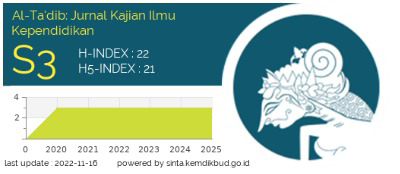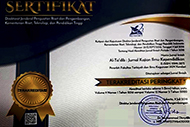Merdeka Belajar di Tengah Pandemi COVID-19: Studi di Sekolah Menengah Pertama di Indonesia
Abstract
The COVID-19 pandemic has a major influence on Indonesia's education system. The enactment of Merdeka Belajar or freedom to learn as the Ministry of Education and Culture of the Republic of Indonesia's regulation is quickly gaining ground due to this pandemic. This paper presents the results of an investigation into the educational trend at an Indonesian high school during the mid-COVID-19 crisis. In this case study, online semi-structured interviews were used. The results indicate that during the COVID-19 pandemic the Merdeka Belajar strategy has been enacted by improving the technological training mechanism available to schools. The first step is to develop the school's internal curriculum through Kampus Merdeka policy and introduce COVID 19 prevention protocols in schools. The second strategy is empowering web-based teaching integration and online asynchronous education.
Full Text:
PDFReferences
Abidah, A., Hidaayatullaah, H. N., Simamora, R. M., Fehabutar, D., & Mutakinati, L. (2020). The impact of COVID-19 to Indonesian education and its relation to the philosophy of “Merdeka Belajar.” Studies in Philosophy of Science and Education, 1(1), 38–49. https://doi.org/10.46627/sipose.v1i1.9
Abidin, Z., Rumansyah, & Arizona, K. (2020). Pembelajaran online berbasis proyek salah satu solusi kegiatan belajar mengajar di tengah pandemi COVID-19. Jurnal Ilmiah Profesi Pendidikan, 5(1), 64–70. https://doi.org/10.29303/jipp.v5i1.111
Aji, R. H. S. (2020). Dampak COVID-19 pada pendidikan di Indonesia: Sekolah, keterampilan, dan proses pembelajaran. Salam: Jurnal Sosial & Budaya Syar-I, 7(5), 395–402. https://doi.org/10.15408/sjsbs.v7i5.15314
Anderson, R. M., Heesterbeek, H., Klinkenberg, D., & Hollingsworth, T. D. (2020). How will country-based mitigation measures influence the course of the COVID-19 epidemic? The Lancet, 395(10228), 931–934.
BNPB. Pedoman penyusunan rencana penanggulangan bencana. Pub. L. No. No. 4 Tahun 2008, 16 (2008).
Darmadi, H. (2015). Tugas, peran, kompetensi, dan tanggung jawab menjadi guru profesional. Jurnal Edukasi, 13(2), 161–174.
Hartini, T., Misri, M. A., & Nursuprianah, I. (2016). Pemetaan HOTS siswa berdasarkan standar PISA dan TIMSS untuk meningkatkan mutu pendidikan. EduMa, 5(2), 83–92.
Hawa, A. M., & Putra, L. V. (2018). PISA untuk siswa Indonesia. Janacitta, 1(1), 1–8.
Herlambang, A. D., & Hidayat, W. N. (2016). Edmodo untuk meningkatkan kualitas perencanaan proyek dan efektivitas pembelajaran di lingkungan pembelajaran yang bersifat asinkron. Jurnal Teknologi Informasi dan Ilmu Komputer (JTIIK), 3(3), 180–187.
kemdikbud.go.id. (2020). Ragam Program Tayangan “Belajar dari Rumah” di TVRI.
Koning, B. B., Rop, G., & Paas, F. (2020). Effects of spatial distance on the effectiveness of mental and physical integration strategies in learning from split-attention examples. Computers in Human Behavior, 110(March), 106379. https://doi.org/10.1016/j.chb.2020.106379
Mahendra, Y. D., & Mariono, A. (2019). Pengembangan media e-modul berbasis aplikasi android materi komunikasi sinkron dan asinkron dalam jaringan mata pelajaran simulasi dan komunikasi digital Kelas X Multimedia di SMK Negeri 1 Sooko Mojokerto. Jurnal Mahasiswa Teknologi Pendidikan, 9(2), 1–9.
Mardiana, D., & Anggraini, D. C. (2019). The effectiveness of utilising web-learning media towards Islamic education learning (PAI) outcome in the era of industrial revolution 4.0. International Journal of Innovation, Creativity and Change, 8(1), 80–96.
Miles, M. B., Huberman, A. M., & Saldana, J. (2014). Qualitative data analysis (3rd ed.). SAGE.
Mustaghfiroh, S. (2020). Konsep “Merdeka Belajar” perspektif aliran progresivisme John Dewey. Jurnal Studi Guru dan Pembelajaran, 3(1), 141–147.
Mustakim, M., Shoffa, S., & Hidayatullah, A. (2019). Pengembangan perangkat pembelajaran blended learning berbasis Schoology untuk meningkatkan literasi digital matematika. Jumlahku: Jurnal Matematika Ilmiah STKIP Muhammadiyah Kuningan, 5(1), 88–99.
Nurfaidah, S., Tambunan, A. R. S., Yonata, F., Kurniawati, D., & Lestariyana, R. P. D. (2020). International students ’ perceptions of virtual service learning program amidst COVID-19 pandemic. Journal of International Students, 10(S3), 198–208.
Purwanto, A. (2020). Studi eksplorasi dampak Work from Home (WFH) terhadap kinerja guru selama pandemi COVID-19. EduPsyCouns, 2(1), 92–100.
Purwanto, A., Pramono, R., Ashari, M., Santoso, P. B., & Mayesti, L. (2020). Studi eksploratif dampak pandemi COVID-19 terhadap proses pembelajaran online di sekolah dasar. EduPsyCouns, 2(1), 1–12.
Puspitasari, & Ratu, N. (2019). Deskripsi pemahaman konsep siswa dalam menyelesaikan soal PISA pada konten space and shape. Mosharafa: Jurnal Pendidikan Matematika, 8(1), 155–166.
Qiu, J., Shen, B., Zhao, M., Wang, Z., Xie, B., & Xu, Y. (2020). A nationwide survey of psychological distress among Chinese people in the COVID-19 epidemic: Implications and policy recommendations. General Psychiatry, 33(2), 1–4. https://doi.org/10.1136/gpsych-2020-100213
Rundle, A. G., Park, Y., Herbstman, J. B., Kinsey, E. W., & Wang, Y. C. (2020). COVID-19-related school closings and risk of weight gain among children. Obesity, 28(6), 1008–1009. https://doi.org/10.1002/oby.22813
Simatupang, N. I., Sitohang, S. R. I., Situmorang, A. P., & Simatupang, I. M. (2020). Efektivitas pelaksanaan pengajaran online pada masa pandemi COVID-19 dengan metode survey sederhana. Jurnal Dinamika Pendidikan, 13(2), 197–203.
Sintema, E. J. (2020). Effect of COVID-19 on the performance of grade 12 students: Implications for STEM education. EURASIA: Journal of Mathematics, Science and Technology Education, 16(7), 1–6.
Telaumbanua, D. (2020). Urgensi pembentukan aturan terkait pencegahan Covid-19 di Indonesia. Qalamuna: Jurnal Pendidikan, Sosial, dan Agama, 12(1), 59–70.
Wang, Chuanyi, Cheng, Z., Yue, X., & McAleer, M. (2020). Risk management of COVID-19 by universities in China. Journal of Risk and Financial Management, 13(36), 1–6. https://doi.org/10.3390/jrfm13020036
Wang, Cuiyan, Pan, R., Wan, X., Tan, Y., Xu, L., Ho, C. S., & Ho, R. C. (2020). Immediate psychological responses and associated factors during the initial stage of the 2019 Coronavirus Disease (COVID-19) epidemic among the general population in China. International Journal of Environmental Research and Public Health, 17(5), 1–25.
DOI: http://dx.doi.org/10.31332/atdbwv13i2.1896
Refbacks
- There are currently no refbacks.
Copyright (c) 2020 Umiarso - El-Rumi

This work is licensed under a Creative Commons Attribution-NonCommercial-ShareAlike 4.0 International License.
| Indexing: |










